-
Par MissGuillotine le 9 Août 2014 à 21:30
09 August 1483 – Opening of the Sistine Chapel in Rome with the celebration of a Mass.
1561 - Elizabeth I declared that bishop's and university fellows' wives could not live in the colleges or cathedral churches.

1588-Speech to the Troops at Tilbury
The Speech to the Troops at Tilbury was delivered on 9 August 1588 by Queen Elizabeth I to the land forces earlier assembled at Tilbury in Essex in preparation for repelling the expected invasion by the Spanish Armada.
Prior to the speech the Armada had been driven from the Strait of Dover in the Battle of Gravelines eleven days earlier, and had by then rounded Scotland on its way home, but troops were still held at ready in case the Spanish army of Alexander Farnese, the Duke of Parma, might yet attempt to invade from Dunkirk; two days later they were discharged. On the day of the speech, the Queen left her bodyguard before the fort at Tilbury and went among her subjects with an escort of six men. Lord Ormonde walked ahead with the Sword of State; he was followed by a page leading the Queen's charger and another bearing her silver helmet on a cushion; then came the Queen herself, in white with a silver cuirass and mounted on a grey gelding. She was flanked on horseback by her Lieutenant General the Earl of Leicester on the right, and on the left by the Earl of Essex, her Master of the Horse. Sir John Norreys brought up the rear.
"My loving people
We have been persuaded by some that are careful of our safety, to take heed how we commit our selves to armed multitudes, for fear of treachery; but I assure you I do not desire to live to distrust my faithful and loving people. Let tyrants fear. I have always so behaved myself that, under God, I have placed my chiefest strength and safeguard in the loyal hearts and good-will of my subjects; and therefore I am come amongst you, as you see, at this time, not for my recreation and disport, but being resolved, in the midst and heat of the battle, to live and die amongst you all; to lay down for my God, and for my kingdom, and my people, my honour and my blood, even in the dust.
I know I have the body of a weak, feeble woman; but I have the heart and stomach of a king, and of a king of England too, and think foul scorn that Parma or Spain, or any prince of Europe, should dare to invade the borders of my realm; to which rather than any dishonour shall grow by me, I myself will take up arms, I myself will be your general, judge, and rewarder of every one of your virtues in the field.
I know already, for your forwardness you have deserved rewards and crowns; and We do assure you on a word of a prince, they shall be duly paid. In the mean time, my lieutenant general shall be in my stead, than whom never prince commanded a more noble or worthy subject; not doubting but by your obedience to my general, by your concord in the camp, and your valour in the field, we shall shortly have a famous victory over these enemies of my God, of my kingdom, and of my people."
10 August 1316 – The Second Battle of Athenry takes place near Athenry during the Bruce campaign in Ireland.
The Bruce campaign was a three-year military campaign by Edward Bruce, brother of the Scottish king Robert Bruce, in Ireland. It lasted from his landing at Larne in 1315 to his defeat and death in 1318 at the Battle of Faughart in County Louth.
After his victory at the Battle of Bannockburn, Robert decided to expand his war against the English by sending an army under his younger brother Edward to invade Ireland. Another reason for the expedition was also the fact that supporters of the exiled House of Balliol had fled to Ireland after fighting at Bannockburn and remained a dangerous threat. These men were led by John MacDougall of Lorn who was the cousin of John III Comyn, Lord of Badenoch, nephew of King John Balliol. The murder of Comyn in 1306 had set off a bloody civil war for the throne of Scotland which King Robert had all but won at Bannockburn and was now attempting to finish off by capturing their last remaining stronghold. Robert was also invited by some of the native Irish to send an army to drive out the Norman settlers and in return they would crown his brother High King of Ireland. This campaign to revive the High Kingship effectively ended with Edward's defeat and death in the Battle of Faughart in 1318.
1489 – Birth of Jacob Sturm von Sturmeck, German politician
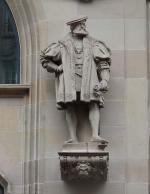
1512-Death of Sir Thomas Knyvett
Sir Thomas Knyvett was a young English nobleman who was a close associate of King Henry VIII shortly after that monarch came to the throne. According to Hall's Chronicle,[Knyvett was a frequent participant in the jousts and pageants of the new king's glittering court and was made Henry's Master of the Horse in 1510.
When Henry declared war on France in 1512, Knyvett, along with Sir John Carew, was given command of the royal flagship, the Regent. With a number of court favourites commanding other vessels, a small fleet set sail for the coast of Brittany. On 10 August 1512 they engaged a slightly larger French fleet, and a violent melee known as the Battle of St. Mathieu ensued off the coast of Brest. Knyvett's ship grappled with the Breton command vessel Cordelière, and was engaged in boarding her when the Cordelière's powder magazine blew up (some say it was deliberately ignited). The two vessels burst into flame. Knyvett and Carew both perished, along with the Breton captain Hervé de Portzmoguer and more than 1,700 men, both French and English.

1512 – The naval Battle of Saint-Mathieu, during the War of the League of Cambrai, sees the simultaneous destruction of the Breton ship La Cordelière and the English ship The Regent.
The naval Battle of Saint-Mathieu took place on 10 August 1512 during the War of the League of Cambrai, near Brest, France, between an English fleet of 25 ships commanded by Sir Edward Howard and a Franco-Breton fleet of 22 ships commanded by René de Clermont. It is possibly the first battle between ships using cannon through ports, although this played a minor role in the fighting.This was one of only two full-fledged naval battles fought by King Henry VIII's Navy Royal.During the battle, each navy's largest and most powerful ship—Regent and Marie-la-Cordelière (or simply Cordelière)—was destroyed by a large explosion aboard the latter.
1519 – Ferdinand Magellan's five ships set sail from Seville to circumnavigate the globe. The Basque second in command Juan Sebastián Elcano will complete the expedition after Magellan's death in the Philippines.
1520 – Birth of Madeleine of Valois

1535 – Death of Ippolito de' Medici, Florence ruler
1553 - Queen Mary holds an obsequy for King Edward
1557 – Battle of St. Quentin: Spanish victory over the French in the Habsburg-Valois Wars.
The Battle of Saint-Quentin of 1557 was fought at Saint-Quentin in Picardy, during the Italian War of 1551–1559. The Spanish, which is to say the international forces of the Habsburg Philip II of Spain, who had regained the support of the English whose Catholic queen he had married, won a significant victory over the French at Saint-Quentin, in northern France
source:wikipedia,the tudors wiki
-
Par MissGuillotine le 7 Août 2014 à 21:40
8 August 1503 – King James IV of Scotland marries Margaret Tudor, daughter of King Henry VII of England at Holyrood Abbey in Edinburgh, Scotland.
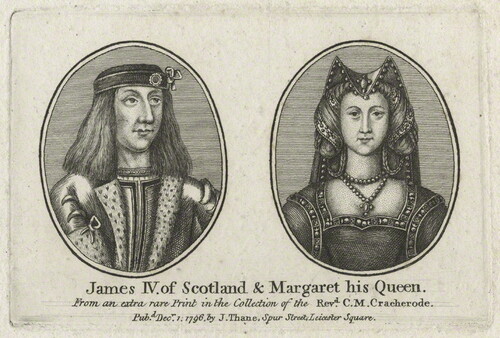
1533- Henry VIII. to Norfolk and Rochford
Had written to him by lord Rochford what arguments he should use to dissuade the French king from meeting the Pope. Suggests further to the same effect that he should urge the inconsistency of the French king's doing so, as he promised that if the Pope took any new steps against his brother he would not meet him. If he denies he made such a promise you shall lament your misfortune in having told us that he had. If he admits it, but thinks this is no innovation, you shall exclaim, "How hard it is that one of my age and place should be invited to your interview with the Pope, and yet 'understand such matter' whereupon neither my master's honor nor my heart will allow me to be present. Occasion will rather be given by my departure to blow abroad the small appearance of friendship between the two Crowns. Irreparable injury will ensue by this meeting, and the opinion of the world, often stronger than truth, will be lost." If he urges that princes must use policy, and pretends that what he is doing is for our benefit, you shall urge that the Pope has treated us with great injustice, that what we have done has been with the French king's advice, and that the Pope has injured us both ; that his citation of us to Rome is a manifest wrong to all princes, in which he still perseveres, notwithstanding the remonstrance of the Cardinals sent by the French king. On consulting him by you lord Rochford how to disclose our marriage, he advised us to knit the nobles of our realm in one accord, and then divulge it ; and as there was no other way so firm to knit them as by Parliament, "all other knots being loose and slippery, this knot of act and statute is by authority thereof permanent and durable, and he ought to be contented now that it is a sure knot, and that we have attempted no innovation of which he was not the substantial author." Therefore, if the Pope persists in proceeding against us, no good can come from his interview with the French king.
To all his attempts to revoke what is done here, we shall say Nay, in such a sort that the world shall hear and the Pope shall feel it. We therefore put our trust in him, and think it would be dishonorable in him to see decay a thing that was of his own foundation, most so to us who have now come to harvest, and trust shortly to see the fruit of our marriage. You shall further say that you know that our determination is fixed, and that we will not allow our marriage, the sentence of the archbishop of Canterbury, the statutes of our realm, or our late proclamation to be touched. Therefore let him make no promise to the Pope in these matters. If he would tell the Pope that unless he make us amends he can have no further amity with him, this will be an honorable course, and induce him and other princes to make our cause their own. If, to remove all suspicion of our amity, he brake off the appointed meeting with the Emperor, there is much greater reason to break off this meeting with the Pope. If you can persuade him to this you are to tarry with him, and consult by what ways and means we can best annoy the Pope. If you cannot, and he urges that it is important for him to have the Duchess in his hands, you shall tell him that you remember he once said he would never conclude that marriage except to do us good, but you cannot prevent him, and therefore only lament the necessity of your returning to England, for you cannot look patiently on your master's enemy. And you shall further signify that we have commissioned Sir Fras. Brian and Sir John Wallop to repair with him to the interview, provided they never present themselves to the Pope. In taking leave of him you shall say that if he will needs meet the Pope he can do nothing so acceptable to you as to persuade the Pope to pronounce the marriage of the lady Katharine null and void.

1535-Katherine of Arragon to Queen Mary of Hungary.
Not to trouble her Highness, has forborne to reply to the letters she lately wrote, but is compelled by the offence given here to God, the danger of her husband's conscience, and the scandal to Christendom, to implore the persons who can help to remedy it. Is informed that there is to be a meeting shortly between her Highness and the queen of France, and, hoping that some good may be done at that time, begs her earnestly for two things; first, to inform the Emperor of the extreme urgency of the matters of this kingdom; and, secondly, when she sees the Queen her sister, to beg of her, with Katharine's recommendations, to use her influence with the King her husband to be a good friend to Henry in getting him to abandon the sin in which he stands. Knows well her Highness is in much trouble seeing his Majesty is in lands so remote. Is troubled at it herself, but restrains herself with the thought that he is engaged in a holy cause in spreading the Christian religion. Hopes, therefore, that God will give him the victory and health to his kingdoms. Thanks Mary for her good offices. Kimbolton
1553 - King Edward VI buried with Protestant rites

1560 – Birth of Elizabeth Báthory, Hungarian murderer
1576 – The cornerstone for Tycho Brahe's Uraniborg observatory is laid on Ven, Denmark.

1585 – John Davis enters Cumberland Sound in search of the Northwest Passage.

1588 – Anglo-Spanish War: Battle of Gravelines – The naval engagement ends, ending the Spanish Armada's attempt to invade England.
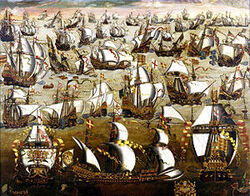
1605 – The city of Oulu, Finland, is founded by Charles IX of Sweden.
1605 – Birth of Cecilius Calvert, 2nd Baron Baltimore, English lawyer and politician

source:http://www.british-history.ac.uk/,wikipedia
-
Par MissGuillotine le 6 Août 2014 à 19:44
07 August 936 – Coronation of King Otto I of Germany.
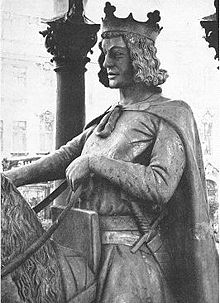
1106 – Death of Henry IV, Holy Roman Emperor

1420 – Construction of the dome of Santa Maria del Fiore begins in Florence.

1427 – The Visconti of Milan's fleet is destroyed by the Venetians on the Po River.
1461 – The Ming Dynasty Chinese military general Cao Qin stages a coup against the Tianshun Emperor.
1485 – Death of Alexander Stewart, Duke of Albany
1514 -King Henry VIII of England concludes an independent peace treaty with France in the War of the League of Cambrai, negotiated by Thomas Wolsey.The War of the League of Cambrai, sometimes known as the War of the Holy League and by several other names,was a major conflict in the Italian Wars. The principal participants of the war, which was fought from 1508 to 1516, were France, the Papal States and the Republic of Venice; they were joined, at various times, by nearly every significant power in Western Europe, including Spain, the Holy Roman Empire, England, Scotland, the Duchy of Milan, Florence, the Duchy of Ferrara, and Swiss mercenaries.Pope Julius II, intending to curb Venetian influence in northern Italy, had created the League of Cambrai, an anti-Venetian alliance that included, besides himself, Louis XII of France, Holy Roman Emperor Maximilian I and Ferdinand II of Aragon. Although the League was initially successful, friction between Julius and Louis caused it to collapse by 1510; Julius then allied himself with Venice against France.The Veneto–Papal alliance eventually expanded into the Holy League, which drove the French from Italy in 1512; disagreements about the division of the spoils, however, led Venice to abandon the alliance in favor of one with France. Under the leadership of Francis I, who had succeeded Louis to the throne, the French and Venetians would, through their victory at Marignano in 1515, regain the territory they had lost; the treaties of Noyon and Brussels, which ended the war the next year, would essentially return the map of Italy to the status quo of 1508.


1514-Engagement of L. d'Orleans, John de Selva, and T. Bohier, on part of Louis XII., to pay one million of gold crowns to Henry VIII.
1514-Treaty of marriage between Louis XII. and the Princess Mary.

1514-Bishop of Worcester to Wolsey
In the marriage contract with the French the Pope desires that he should be mentioned with honor, as he was the first to propose it to France and England, and he desires that the former should be aware of their obligation. If the friendship between Henry VIII. and the King Catholic endure it will be easy to bridle the inconstancy of the French. The Pope is displeased that he has received no notice from England of this affair, although the French have bragged for the last eight days that the marriage has been concluded. They say the same of the treaty, which ought not to have been divulged, to make it appear that the Swiss have been abandoned by England. As to the treaty of which [Wolsey] has sent the writer a copy of the articles which he believes will be concluded, the Pope is pleased with it, but does not think it proper that the Swiss should be expressly mentioned. Sends a copy of a note received from his Holiness of points he wishes inserted. If this is done it will bind his Holiness to grant the legation, if not for life, at least in prorogation. Once again reminds him that in the marriage and treaty all regard should be had for the Pope's honour.
1549 - Mary, Queen of Scots sails for France

1560 – Birth of Elizabeth Báthory, Hungarian serial killer
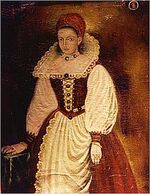
1571 – Birth of Thomas Lupo, English viol player and composer
1574 – Birth of Robert Dudley.He was an English explorer and cartographer. In 1594, he led an expedition to the West Indies, of which he wrote an account.
He was the illegitimate son of Robert Dudley, 1st Earl of Leicester, he inherited the bulk of the Earl's estate in accordance with his father's will, including Kenilworth Castle. In 1603–1605 he tried unsuccessfully to establish his legitimacy in court. After that he left England forever, finding a new existence in the service of the Grand Dukes of Tuscany. There he worked as an engineer and shipbuilder and designed and published Dell'Arcano del Mare, the first maritime atlas to cover the whole world. He was also a skilled navigator and mathematician. In Italy he styled himself "Earl of Warwick and Leicester", as well as "Duke of Northumberland", a title recognized by the Emperor Ferdinand II.
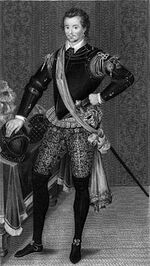
1613 – Death of Thomas Fleming, English judge and politician, Lord Chief Justice of England

source:wikipedia,http://www.british-history.ac.uk/
-
Par MissGuillotine le 5 Août 2014 à 21:27
06 August 1414 – Death of Ladislaus of Naples

1458 – Death of Pope Callixtus III

1504 – Birth of Matthew Parker, English archbishop
1514 - Marriage of Margaret Tudor and Archibald Douglas, 6th Earl of Angus
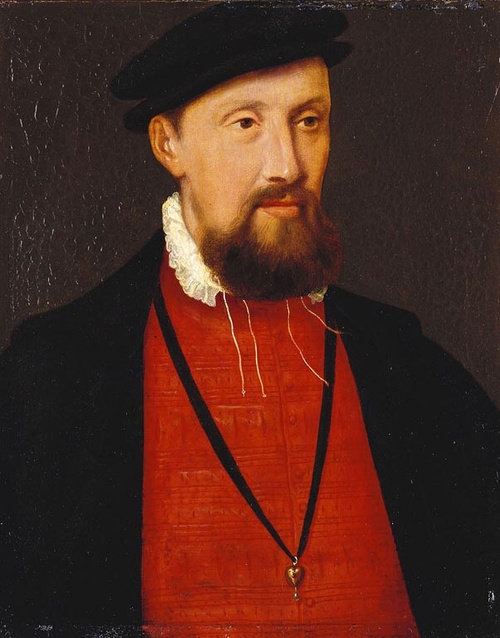

1544-Queen Catherine Parr to the Council with the King.
Has seen their letters of the 4th inst showing the King's health and success. By advice of the Council here Sir Robert Tirwhit is sent to London to despatch the ordnance mentioned in the said letters and also 2,000 spades, shovels and mattocks if they may be had. As it appears that only 13 hoys can be had for the lead, and they will only go to Lynne, Boston and Newcastle, and not thither without wafting, the Council will order crayers and ships for the purpose; but think some order should be taken, for their wafting, there where my lord Admiral is, and that it is better that it remain here than be sent forth without better wafters than can here be provided. Encloses certain letters which were sent to the Council upon a vain rumor of the landing of Frenchmen. Fearing that some seditious person had spread the rumor (for a landing of Frenchmen about Gloucester was unlikely), despatched to the justices of peace of the countries adjoining to stay the countries and enquire the truth; and received reply that all was well and the rumor supposed to arise by the departing of the navy from Bristoll for the conveyance of Lynoux, "which they judged to have departed thence as yesterday." Notifies this because such vain rumors fly fast, and this may have reached the King. The Prince and the rest of the King's children are well. Hampton Court, 6 Aug.
The Council of the North to the Council with the Queen.
As lately commanded by my lord Lieutenant in these parts, we send to the Queen (by John Broxhame, gent.), Sr de Bauldrell, Alexander the Italion and two other of the Scottish and French prisoners lately taken at Scardburgh, Yorks., by whom "we think most may be learned of their purpose into France. The Sr de Bauldrell, as we be informed by a surgeon, "is diseased in the head with the French poxe and also with another unhonest disease." The King's palace at York, 6 Aug.
1609 – Birth of Richard Bennett, English politician, Colonial Governor of Virginia
1623 – Death of Anne Hathaway, wife of William Shakespeare

source:wikipedia,http://www.british-history.ac.uk/
-
Par MissGuillotine le 4 Août 2014 à 21:31
05 August 1100 – Henry I is crowned King of England in Westminster Abbey.

1278 – The Siege of Algeciras ends in the context of the Spanish Reconquista pitting the forces of the Kingdom of Castile against the Emirate of Granada. The battle resulted in a Granadan victory.
1305 – William Wallace, who led the Scottish resistance against England, is captured by the English near Glasgow and transported to London where he is put on trial and executed.

1388 – The Battle of Otterburn took place on 5 August 1388,or 19 August according to English sources,as part of the continuing border skirmishes between the Scottish and English.
The best remaining record of the battle is from Jean Froissart's Chronicles in which he claims to have interviewed veterans from both sides of the battle. His account is still regarded with some concern as details, such as the distance between Newcastle upon Tyne and Otterburn, are incorrect.
The Scottish noble James, 2nd Earl of Douglas decided to lead a raid—one of a continuing series on both sides of the border—into English territory. It was timed to take advantage of divisions on the English side between Lord Neville and Henry Percy, 1st Earl of Northumberland who had just taken over defence of the border.

1461 – Birth of Alexander Jagiellon, Polish king
1534-Reformation of the Church.
“How the false heresies which the bishop of Rome hath taught the people should be brought out of their conscience and hearts.”
1. The archbishop of Canterbury should summon a council of bishops and doctors, and have them sign their decision on each of the articles contained in the “book of the charge.” Which done, copies should be sent to each county with command to every sheriff, custos rotulorum and justice of the peace, to have them read at every sessions and great leet. All parish churches should be visited, and the curates examined how they instruct the people. Let six or seven masters of the Chancery “of the right sort, nothing favoring the Pope's laws, nor having living thereby,” be appointed to judge questions of heresy. And let sermons in English be drawn up and appointed to be preached by the curates every Sunday.
Pamphlets against the doctrines of celibacy of the clergy, honoring of images and prayers for the dead to be printed before Parliament begins.
“Bills to be drawn against the next Parliament:”
1. Allowing priests to marry and to work for their living. 2. Prohibiting, on a penalty of 10l., all offerings to images. 3. For the reformation of the pleading in the common law. 4. For reformation of the Court of Chancery “as well for injunctions procedendo and examiners of witness.” 5. For the excessive fees taken by clerks for writing in every court in England.

1540 – Birth of Joseph Justus Scaliger, French philologist and historian
1549-Clyst St Mary was the site of one of the decisive battles in the 1549 Prayer Book Rebellion, when West Country resistance to the Protestant Reformation was quashed. After the Battle of Woodbury Common on 4 August 1549, the rebels under the control of Humphrey Arundell had re-grouped with the main contingent of 6,000 at Clyst St Mary, but on 5 August were attacked by a central force led by Sir William Francis, under the control of John Russell, 1st Earl of Bedford. After a ferocious battle Russell's troops gained the advantage leaving a thousand Cornish and Devonians dead and many more taken prisoner, 900 of whom were massacred later that day at Clyst Heath. The village was burned and many of the combatants and villagers drowned in the river
1583 – Sir Humphrey Gilbert establishes the first English colony in North America, at what is now St. John's, Newfoundland and Labrador.
1600 – The Gowrie Conspiracy against King James VI of Scotland (later to become King James I of England) takes place.
1601 - Burial of Henry Norris, 1st Baron Norris of Rycote, courtier, diplomat and son of Sir Henry Norris, one of the men executed for alleged adultery with Queen Anne Boleyn.
Henry died on 27 June 1601, having outlived his wife and five of his children, and was temporarily buried, on 21 May, in the church at Englefield, where his son Edward was living.Finally, on 5 August, he was re-interred at Rycote, in a vault beneath the chapel of St Michael and All Angels, in the grounds of Rycote House. His will was dated 24 September 1589.
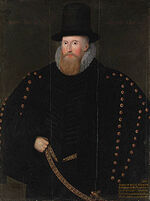
source:wikipedia,http://www.british-history.ac.uk/
 Suivre le flux RSS des articles de cette rubrique
Suivre le flux RSS des articles de cette rubrique





